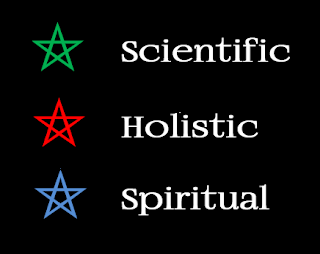
Does Tarot work? That's the question I get asked most often when I tell people that I know how to read Tarot cards. The answer to that question depends on your understanding of what Tarot is and what misconceptions you might have.
As I attempt to explain in my book The Tarot Trifecta there are 3 main schools of thought when it comes to Tarot that can best be described as the Spiritual, Scientific, and Holistic approach.
The Spiritual approach to reading Tarot is the one most people will at least be vaguely familiar with. This approach holds that a reader draws cards from a deck guided by Spirits or some other metaphysical influence and interprets a message for the querent - the person who asked for the reading. This approach relies most heavily on anecdotal evidence and is the most difficult to quantify, it is perhaps best described as the most sociological of the three schools of thought.
The Scientific approach to reading Tarot relies only on the fact that Tarot decks provide 78 cards of static images that can be assigned perspectives and used as a tool for reframing as part of Cognitive Behavioural Therapy. This approach does not rely on anything other than that which is empirical in nature, it relies on statistics and mathematics and ultimately serves as an explanation for why so many people find Tarot useful whether they have preconceived notions or not; it is also the approach that is most analogous to the claim that all Horoscopes are generic and only serve a purpose for individuals because any individual can make any horoscope fit their life.
The Holistic approach turns away from the querent and turns instead to the reader who interprets the cards and attempts to explain how you can educate yourself on the nature of Tarot, come to understand its meaning, both symbolic and logical in nature and guide you in applying this understanding to the querent, or to yourself if you choose to perform readings for self-reflection. Unfortunately this school of thought whilst the most useful of all 3 also serves as the school most open to abuse as its focus deals with your understanding of Tarot and how to apply it to an individual's life and circumstances which lends itself to confidence trickery. The Holistic approach is perhaps best described as the objective approach with no vested interest in either camp but instead focusing on the utility of Tarot.
In simplest terms, Tarot provides you with 78 cards split into two sections known as Arcana, they are the Major Arcana and the Minor Arcana. The Major Arcana is comprised of 22 cards with symbols that people can visually interpret like Death, The Devil, The Magician etc and the Minor Arcana which is comprised of four suits of 14 cards each totalling 56 cards; the most common configuration being the suits of Wands, Cups, Swords, and Pentacles. Each card has a traditional meaning associated with it, and once you learn these meanings you can use one of the three schools of thought to decide how to apply that meaning.
Anyone can learn the symbolism and the history of Tarot, but the reason perhaps above all else why Tarot has been so successful and persistent across the centuries is because the act of reading Tarot for someone else is an act of service, it is a social interaction that in essence serves as a form of therapy. The Scientific approach attempts to formalise this by borrowing from the reframing techniques of Cognitive Behavioural Therapy and applying them to the Tarot cards themselves. Regardless of intent however the therapeutic nature of Tarot remains, there is an individual who is usually struggling with something in their life, and there is a reader who gives that individual time, attention, and their undivided focus. It isn't a substitute for traditional Therapy but it serves a similar function albeit in a much less intimidating way.
I believe everyone should learn how to read Tarot, even if you have no Spiritual belief in it, understanding how and why so many people connect with it can bring you to a point of understanding and self-reflection that you might not otherwise reach; indeed those who go on to pull Tarot cards daily for themselves often describe the practice as almost meditative in nature.
Does Tarot work? The short answer, is that entirely depends on your interpretation of it. In broad terms yes it does work because it provides utility that benefits those who use Tarot, but in specific terms, it depends on how technical you want to get.
Tarot is best approached from an agnostic point of view, neither asserting a positive or negative but remaining objective. "Disproving Tarot" is erroneous and ironically serves as a fool's errand because it necessitates asserting a negative which goes against the Scientific Method, asserting a negative as true is a logical fallacy, you can only ever assert a lack of evidence for the positive assertions or disprove that evidence and since Tarot advocates rely entirely on anecdotal evidence there isn't much to disprove, as these are ultimately opinions and opinions by their nature are not facts.
The Scientific approach outlined in my book does not rely on opinions, all three schools of thought are provided and detailed with the reader left to decide for themselves where their faith lies.

No comments:
Post a Comment
All comments are moderated before they are published. If you want your comment to remain private please state that clearly.